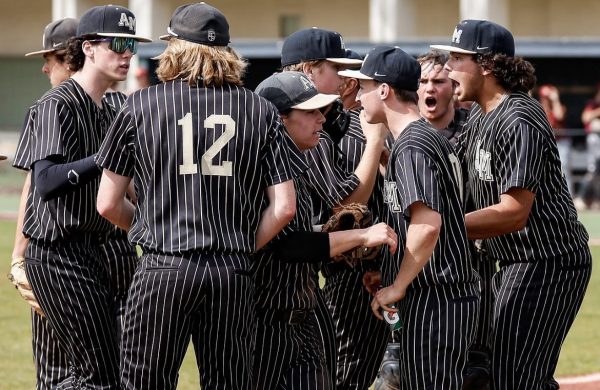In baseball, the coach’s role extends far beyond strategizing for wins and losses. The coach shapes the players’ character, fosters teamwork, and builds values that extend beyond the field. Although the coach manages so many aspects of the team, the effect of their efforts is found in each member and in the culture. At Mitty, the heart of varsity baseball culture is leadership.
Mitty’s head coach, Brian Yocke, not only orchestrates practice plans but also assumes the responsibilities of in-game management, from pitching changes to lineup adjustments. While specializing in coaching outfielders, Coach Yocke adapts to the needs of the team each season, giving focus to each player so they can reach their full potential.

Surprisingly, Coach Yocke actually loved football first, which is reflected through his demeanor that blends elements of toughness with genuine care. While expectations remain high, his emphasis lies on nurturing players through challenges, using a philosophy of “loved tough” as opposed to “tough love.”
Along with Coach Yocke are Coach Danny, the hitting coach; Coach P, the catchers’ coach; Coach Jeremy, the pitching coach; and Coach JP, the infielders’ coach. These 5 form a coaching staff that develops the athletes as both baseball players and people in the community.
The coaches emphasize a culture of service towards others, where players prioritize the team’s goals over individual success. Showing leadership through service is prioritized over simply using words or actions, as Coach Yocke says, “what we’re always trying to preach is ‘how can you showcase others?’”
The strong culture is also exemplified through the acronym PURE. It shapes players into well-rounded individuals who have a commitment to pride, unity, respect, and excellence/enthusiasm. Out of excellence and enthusiasm, the latter is usually emphasized more, which aligns with the coaches’ philosophy of prioritizing fixing problems in each player’s character.
But coaches don’t just focus on the sport, they also focus on holistically developing the athletes. They connect with the players at a personal level, as they strongly focus on being available. Being prepared to serve the players and holding the standard up are a close second and third, respectively. Above all, they highlight character. Coaches commonly share life and baseball stories for the betterment of the players’ personal lives. As a result, senior Makoa Sniffen says, “I feel like I can go up to all five of the coaches and talk to them about anything I need—in baseball or in life.”
While leadership from Coach Yocke and his staff plays a huge role in shaping the philosophy of the team, leadership from players takes that philosophy and turns it into their culture. Key parts of player leadership within the program include connecting with other players at all times, holding up the bar and standard, and passing on leadership qualities to younger players.
A unique aspect of leadership within Mitty baseball is the absence of any sort of team captains. This is because Coach Yocke believes, “life does not have captains, but it does have people that have leadership qualities.” The lack of a formal leadership role promotes all players to step up and lead by example, exemplifying a culture of unity and commitment.

